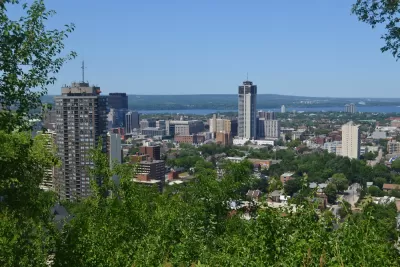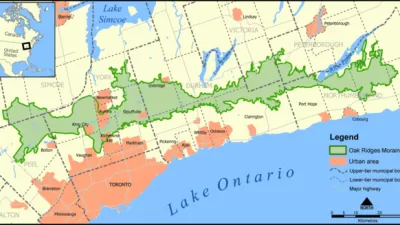The Toronto Greenbelt was an urban growth boundary created in 2005 as one of the most obvious political victories for the Smart Growth movement in North America. A new bill would reverse course on the region’s growth policies.

“The Ontario government announced plans Friday to open up thousands of acres of land in the protected Greenbelt for development, going back on years of promises to leave it intact,” reports Emma McIntosh for the Narwhal.
The Progressive Conservatives, led by Ontario Premier Doug Ford, would build 50,000 housing units passed the edges of the region's urban growth boundaries to address the high cost of housing in the province. The plan is included in Bill 23, also known as the “More Homes Built Faster, 2022” bill.
“Ford’s plan to open up Ontario’s Greenbelt is essentially a massive land swap. The idea, the province says, is that it can drop some pieces of the protected area and add other, bigger pieces to make up for it. But the Greenbelt is huge, important and contentious, and changes to it are the result of decades of pressure from opponents,” writes McIntosh.
Toronto Star columnists have not responded positively. In a column for the Star [paywall], Martin Regg Cohn describes the plan as Premier Ford revealing his “true colours.”
“Back in 2018, Ford promised developers privately he’d open up vast tracts of land. Caught on video, he quickly repudiated the plan, vowing to leave it untouched,” writes Cohn. “Notwithstanding those words, the premier is going back on his word in 2022.”
In another column for the Star [paywall], Edward Keenan writes that Ford’s “flip flop” on the Greenbelt has left the columnist grasping for words—examining words like credulous before considering corruption and capture. “But I am not accusing anyone of corruption. I am not even suggesting it as the most likely explanation. Because there’s another ‘C’ word that came to my mind even quicker: ‘capture,” writes Keenan. “As in the term “regulatory capture.” That’s a phenomenon where a government body meant to regulate an industry is so cosy with those it is supposed to regulate that it routinely serves their interests rather than the public’s. Another term for it — also beginning with a ‘C’ — is ‘client politics,’ because the regulator comes to see those they are policing as their client.”
Writing in support of Bill 23 for the National Post, Steve Lafleur and Josef Filipowicz argue that the region can no longer wait for “perfect solutions” to the its housing affordability crisis.
Planetizen documented several earlier iterations of the Progressive Conservatives’ flirtation with Greenbelt development, including while Ford was as a candidate for premier in 2018 and in a bill that followed in early 2019.
FULL STORY: Everything you need to know about Doug Ford’s plan to cut into Ontario’s Greenbelt

Montreal Mall to Become 6,000 Housing Units
Place Versailles will be transformed into a mixed-use complex over the next 25 years.

Planetizen Federal Action Tracker
A weekly monitor of how Trump’s orders and actions are impacting planners and planning in America.

California High-Speed Rail's Plan to Right Itself
The railroad's new CEO thinks he can get the project back on track. The stars will need to align this summer.

Nevada Legislature Unanimously Passes Regional Rail Bill
If signed by the governor, the bill will create a task force aimed at developing a regional passenger rail system.

How Infrastructure Shapes Public Trust
A city engineer argues that planners must go beyond code compliance to ensure public infrastructure is truly accessible to all users.

Photos: In Over a Dozen Cities, Housing Activists Connect HUD Cuts and Local Issues
We share images from six of the cities around the country where members of three national organizing networks took action on May 20 to protest cuts to federal housing funding and lift up local solutions.
Urban Design for Planners 1: Software Tools
This six-course series explores essential urban design concepts using open source software and equips planners with the tools they need to participate fully in the urban design process.
Planning for Universal Design
Learn the tools for implementing Universal Design in planning regulations.
City of Camden Redevelopment Agency
City of Astoria
Transportation Research & Education Center (TREC) at Portland State University
Municipality of Princeton (NJ)
Regional Transportation Commission of Southern Nevada




























